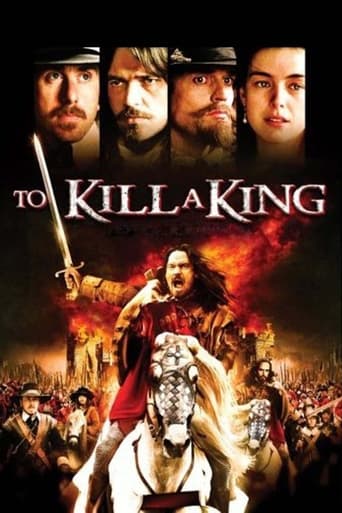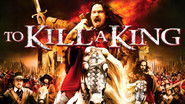Spikeopath
To Kill a King is directed by Mike Barker and written by Jenny Mayhew. It stars Tim Roth, Dougray Scott, Olivia Williams, James Bolam and Rupert Everett. Music is by Richard G Mitchell and cinematography by Eigil Bryld.It's the end of the English Civil War and with King Charles 1st (Everett) held prisoner by the Parliamentarians, Sir Thomas Fairfax (Scott) and Oliver Cromwell (Roth), friends and colleagues, fall out over the best plan of action for the New England.A severely troubled production and budgetary constraints left To Kill a King with a mountain to climb just to get acknowledged as a historical epic of worth. Add in the dubious take on this part of English history that so irked the historians, and you would be forgiven for thinking that the film is something of a stinker. Not so actually. For although it's clearly far from flawless, it's a literary piece of work that chooses character dynamics over blood and thunder. Suffice to say that those searching for a battle strewn epic should look elsewhere, but if you have a bent for observations on key personalities involved in war politics during times of upheaval in a period setting? Then this delivers the goods. Well performed by the principal players as well. 7/10
MartinHafer
We Americans are pretty bad at knowing our own history let alone that of other countries. As a retired World History teacher, I know that very, very few of us know about the English Civil War of the 17th century. Who fought on each side and what they were fighting over is not something most Americans would know. I know--but considering my job, that's no surprise! So, unless you are really up on English history as well as the lives of Oliver Cromwell and Charles I, you might just want to read up on it before you watch "To Kill a King". Also, you might want to read a few different sources, as most British authors I've read seem to think killing the king was a bad thing--whereas non-Brits probably are more willing to concede that this was pretty cool (particularly American or Marxist historians--who, for once, would agree with each other).So, I'll give you a bit of background. This story is about the latter portion of the Civil War. Many years have passed and the armies of the Parliament and the King's have fought many battles against each other. Each time the King's forces have been vanquished, he makes promises to make reforms. And, once the armies went home, the King simply ignored these reforms--and the war began anew. The main problem, as I see it, is that the King believed he was an absolute monarch and the Parliament was standing firm on their traditional rights--such as the right to tax (which the King repeatedly ignored). Now, with few remaining friends of his own, the King takes a 'divide and conquer' strategy. In other words, divide the members of Parliament by promising various rewards and bribes. He also escaped custody and threatened to raise yet another army to begin the war again. Now, in light of all this, the leaders of the insurrection now see a need to end it...by killing their king. The army's leader, Fairfax, is reticent--and the man who is one of the powerhouses in Parliament, Cromwell, sees the execution as inevitable. While the film is about this divide and conquer scheme and the eventual trial of the King, it is difficult to understand all that led up to this--a weakness in the film that might have been dealt with by using a prologue or stretching out the film a bit longer.For history teachers and folks in the know, "To Kill a King" is good stuff--well acted and produced (even if the army of the Parliament only seems to have been made up of about 50 guys in this film!). Otherwise, it does seem to be lacking context which would make it easier to follow--as well as very low energy despite the theme.
Armand
important - the acting. out of historical accuracy , it is story of a friendship and drawing of a revolution. nothing more. and result is a good tale in which lights and shadows, atmosphere and crumbs of events are at well place. interesting is science of Rupert Everett to propose a credible Charles . and Tim Roth is great - out of any surprise. but more that, it is an ash carpet. the details of Cromwell regime are lost. the labyrinth of friendship - ambiguous. the scene - full of masks. and the impression who remains is same - a great play in fragile skin. not an error but ambition to say all. not a mistake but too much ambition to give life, force and color to an old and cruel story.
angie-235
On first viewing I was not really satisfied with this film. Who could deal with such a vast subject in one film? It was clever to not tackle the whole war but concentrate on a shorter time frame. I have no knowledge of any of the actors except James Bolam. I would not have cast Rupert Everett on looks , height etc but how little that matters . He is really excellent , he uses his eyes to great effect .The King's continued belief that he will be rescued , the British people really do love him are obvious at first . It is the pain and fear in his eyes that really seals it for me .His walk to the block ( being fondled and clawed at by the commoners is obviously repellent and terrifying). There is something about the whole scene that really reflects King Charles's inner faith that this is his second wedding day ,this time to Jesus . Tim Roth plays Cromwell with a touch too many Hitler like stances but he is so much better than Richard Harris. I think many historians do think Cromwell had mental illness. The Govt. by his New Model Army reminds me of The Taliban .I would have been on the side of Parliament but like many English people welcomed back the monarchy after his rule. I have little knowledge of Fairfax but the relationship between the two is worth reading about if this film is anything to go by. The sets are fantastic ,the actual Hampton Court was worth it . I am sure that even Civil War buffs should acknowledge it's intelligence . I only wish the creators could have made a series. Things worth looking out for are the severe uniforms worn at the King's trial ,note a love of buttons ( Cromwell truly was a dictator worthy of Pinochet). The King's absolute lack of understanding the ranting man who made no sense to his perception of his place in the World.The bewilderment of Cromwell that anyone should see things other than his way. If you weren't sure on first viewing give it a second and third chance. I don't see any flirting between Charles 1st and Lady Fairfax b.t.w just a lonely man desperate for company of his class and a woman in awe of the most important man in the country in her eyes.




